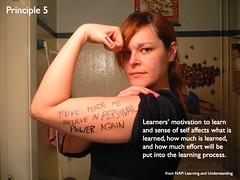
What
are the personal characteristics of a coach? It's an interesting question because the response, while apparently simple, also requires a look at characteristics that could potentially work against a coach, and their suitability to develop in an organisation in that role.
Every individual has a different personality, and this means that every coach must, as a consequence, be different. Each coach uses similar tools or approaches, but each is different because the coach’s personality shapes and influences how the coaching is experienced. However, there are some personal characteristics that form the foundation of really effective coaching. I will reflect on some of the strengths and attributes that I have found have helped - or that I need to work on to develop further - as a coach.
1. Self-awareness
As someone who is usually self-aware, I find that this has been a real help in developing as a coach. It means, that, for instance, I am aware of the nuances of how I am listening, or asking questions … or that I have momentarily let my concentration drop.
On the down-side, this self-awareness can mean that when I identify that I have not performed as well as I might, or a coachee gives me feedback that they would have liked to have covered something differently in a session, for example, I have a tendency to over-analyse. On the upside, this means that I don’t tend to make the same mistake or misinterpretation twice!
I am also aware that I am an introvert, who enjoys her own space, and is happy to go days on end without talking with anyone. This can mean on busy days I feel exhausted when I have been coaching several people. On the other hand, one of the benefits of being an introvert is being very happy to listen, and I have received feedback from some of my coachees that they feel I am a really good listener and asker of questions. “To listen is to be the master of both content and context” (Burdett, 2005, p. 8), so the focus for me is to remain fully engaged and non-judgemental so that I can listen for what a coachee says, as well as what they don’t say - the gaps, silences, and hesitations - which can help uncover the coachee’s intentions.
2. Flexibility
Every coachee will need different approaches depending on their own preferences, as well as their context and/or current circumstances. As such, I find that I need to work closely with a coachee to initially identify what these preferences are; for example, a more analytical coachee may identify that discussion of process and data is really helpful for them. Then, during each subsequent session, I ensure that I adjust the approach and tone I am using to continue to ‘go where the coachee needs to go’.
Something I have to be aware of though is supporting my coachees to unpack their challenges, sometimes “introducing conflict to promote self-examination and further development of alternative perspectives” (Stokes, 2011, p. 8). This isn’t always easy and is likely to be challenging, but when I do it well, it results in us both becoming aware of shifts in perspectives and thinking. These factors help the coachee and I watch for indications “that the relationship may be transformative and growth producing for both partners” (Stokes, 2011, p. 8).
3. Patience
I have a very positive attitude, and am committed to work actively with my coachees such that I am “an active partner in the communication dance” (Burdett, 2005, p. 8). One thing that can be frustrating, however, is when the coachee and I have worked together, and the coachee has identified their goals and the changes that they want to work toward - and yet progress seems to be three steps forward and one step backwards. The frustration comes from knowing the person has the potential to change and a sense that sometimes they aren’t making the progress that they might be.
However, I am also acutely aware that change - especially in core beliefs and identity - takes time and energy, and is not comfortable. Patience is required to help ensure ongoing motivation, recognition, the celebration of positive growth when it occurs, and at all times the provision of “a mirror… to extend the...[coachee’s] self-awareness” (Daloz, 1986, in Stokes, 2011, p. 8). Sometimes mistakes are made (analysed by the coachee and learned from), and I find that kindness and empathy can be powerful ways of supporting a coachee through challenges.These factors can be enhanced by the practical strategies I use, such as helping my coachees stick to our coaching schedule, using a consistent process, and ensuring that I remain reliable.
The knowledge of my own characteristics means that I am conscious of both the benefits and the drawbacks, and can actively tweak, respond and reflect during and after coaching sessions.
What are your characteristics?
Reference
Burdett, J. (2005). The listening paradox.
Organizational Performance Review, 7-9.
Image
Me Fish! CC ( BY ) licensed Flickr image by Hamed Saber:
https://flic.kr/p/2t37Rp












